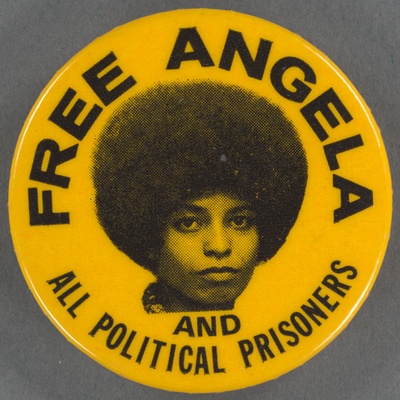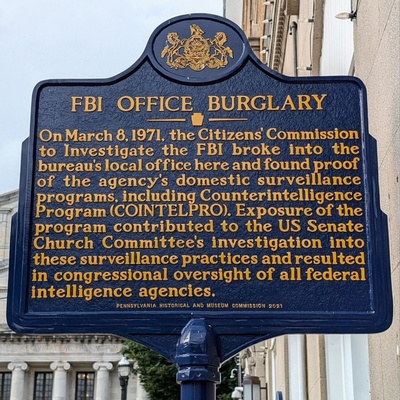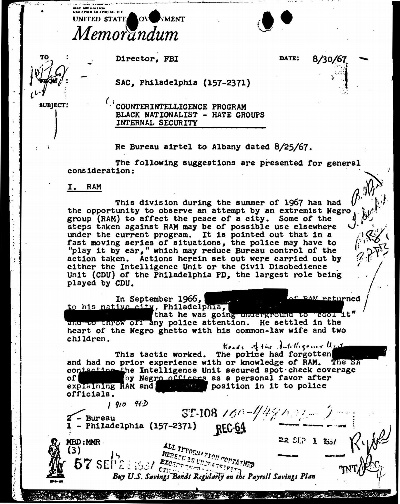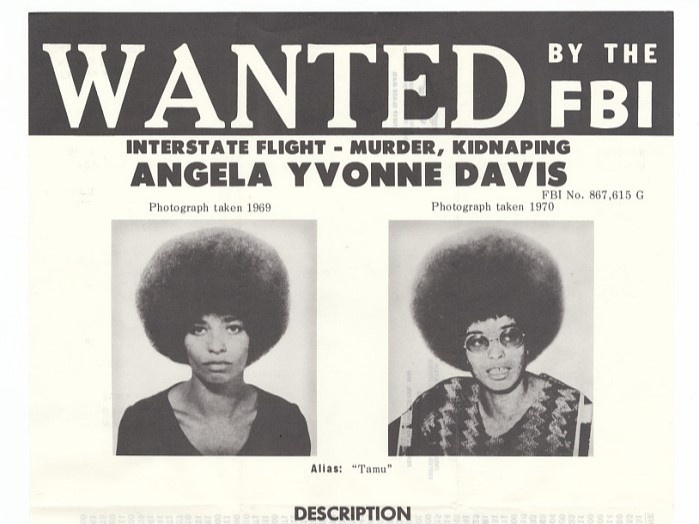On August 7, 2024, at 6:00 p.m., the Free Library's Social Science and History Department will host a discussion by Dr. Kelly Harris of the University of Pennsylvania's Center for Africana Studies about the history of the FBI's Counter Intelligence Program (COINTELPRO), in recognition of Black August.
Black August is a month-long commemoration to acknowledge and honor Black political prisoners and ongoing resistance to racial oppression. Rooted in the Black Power Movement of the 1960s and 1970s, Black August was first observed in 1979 among people incarcerated in California prisons to commemorate the deaths of prison activists like George Jackson. The month of August is also historically significant as the start of the Haitian Revolution (1791), Nat Turner’s Rebellion (1831), the births of Pan-African leader Marcus Garvey (1887) and Black Panther Party chairman Fred Hampton (1948), the death of W.E.B. Du Bois (1963), and the Watts (1965) and Ferguson (2014) Uprisings.

This political button from the early 1970s shows support for then-imprisoned activist Angela Davis.
One of the major obstacles to Black Power organizing and resistance efforts was COINTELPRO, the Counterintelligence Program led by the Federal Bureau of Investigation beginning in 1956. This covert surveillance and infiltration operation was revealed in 1971 after activists broke into an FBI office in Media, Pennsylvania, and released classified documents to the public. Dr. Harris will explore the history of COINTELPRO and efforts to resist its impact.
Join us on Wednesday, August 7 in the Fourth Floor Skyline Room in Parkway Central Library to learn more from Dr. Harris. Registration is encouraged, but not required.

In 2021, the Pennsylvania Historical and Museum Commission erected a historical marker in Media, PA outside the former local offices of the FBI where documentation of the often illegal activities of COINTELPRO were first uncovered.

This COINTELPRO memo from August 1967 details FBI surveillance of the Revolutionary Action Movement, a Philadelphia-based organization active in the 1960s. More COINTELPRO documents acquired through the Freedom of Information Act can be found in the FBI's digital archives.
In the meantime, check out this Black August reading list to explore topics around COINTELPRO and resistance throughout Black history:
Angela Davis: An Autobiography (Third Edition) (2021) by Angela Y. Davis
Angela Y. Davis has been a political activist at the cutting edge of the Black liberation, feminist, queer, and prison abolitionist movements. 50 years after its original publication, the author revisits her life's story in print.
We Refuse: A Forceful History of Black Resistance (2024) by Kellie Carter Jackson
Black resistance to white supremacy is often reduced to a simple binary, between Dr. Martin Luther King Jr.'s nonviolence and Malcolm X's "by any means necessary." In We Refuse, historian Kellie Carter Jackson urges us to move past this false choice, offering an unflinching examination of the breadth of Black responses to white oppression, particularly those pioneered by Black women. The dismissal of "Black violence" as an illegitimate form of resistance is itself a manifestation of white supremacy, a distraction from the insidious, unrelenting violence of structural racism. Force — from work stoppages and property destruction to armed revolt — has played a pivotal part in securing freedom and justice for Black people since the days of the American and Haitian Revolutions. But violence is only one tool among many. Carter Jackson examines other, no less vital tactics that have shaped the Black struggle, from the restorative power of finding joy in the face of suffering to the quiet strength of simply walking away. Clear-eyed, passionate, and ultimately hopeful, We Refuse offers a fundamental corrective to the historical record, a love letter to Black resilience, and a path toward liberation.
The Burglary: The Discovery of J. Edgar Hoover's Secret FBI (2014) by Betty Medsger
The Burglary is an account of the 1971 break-in of the FBI offices in Media, Pennsylvania, by a group of unlikely activists, citing their roles in triggering major changes in the FBI and confirming that J. Edgar Hoover ran a personal shadow FBI.
Captive Nation: Black Prison Organizing in the Civil Rights Era (2014) by Dan Berger
In this pathbreaking book, Dan Berger offers a bold reconsideration of 20th-century Black activism, the prison system, and the origins of mass incarceration. Throughout the Civil Rights era, Black activists thrust the prison into public view, turning prisoners into symbols of racial oppression while arguing that confinement was an inescapable part of Black life in the United States. Black prisoners became global political icons at a time when notions of race and nation were in flux. Berger traces the dynamic and dramatic history of this political struggle, showing that the prison was a central focus of the Black radical imagination from the 1950s through the 1980s.
Live From Death Row (2002) by Mumia Abu-Jamal
After 20 years on death row, Mumia Abu-Jamal was released from his death sentence ... but not the conviction. This once prominent radio reporter was convicted for the murder of Philadelphia police officer Daniel Faulkner in 1982, after a trial many have criticized as profoundly biased. Live from Death Row is a collection of his prison writings — an impassioned yet unflinching account of the brutalities and humiliations of prison life, and a scathing indictment of racism and political bias in the American judicial system.
Racial Matters: The FBI's Secret File on Black America, 1960-1972 (1991) by Kenneth O'Reilly
From Kennedy to Nixon, the FBI unwillingly found itself at the center of the struggle for racial equality and justice. Kenneth O'Reilly tells the shocking story of how political loyalties, priorities, and prejudices turned a government agency into an adversary — instead of a protector — of civil rights.
The Judas Factor: The Plot to Kill Malcolm X (1992) by Karl Evanzz
In this fascinating and shocking expose, investigative journalist Karl Evanzz uncovers new evidence of a conspiracy to silence Malcolm X and the entire Black nationalist movement.
Soledad Brother: The Prison Letters of George Jackson (1994) by George Jackson
A collection of Jackson's letters from prison, Soledad Brother is an outspoken condemnation of the racism of white America and a powerful appraisal of the prison system that failed to break his spirit but eventually took his life. Jackson's letters make palpable the intense feelings of anger and rebellion that filled Black men in America's prisons in the 1960s. But even removed from the social and political firestorms of the 1960s, Jackson's story still resonates in its portrait of a man taking a stand even while locked down.
Fire This Time: The Watts Uprising and the 1960s (1995) by Gerald Horne
In August 1965 the predominantly Black neighborhood of Watts in Los Angeles erupted in flames and violence following an incident of police brutality. This is the first comprehensive treatment of that uprising. Property losses reached hundreds of millions of dollars and the official death toll was 34, but the political results were even more profound. The Civil Rights Movement was placed on the defensive as the image of meek and angelic protestors in the South was replaced by the image of "rioting" in the West. A "white backlash" ensued that led directly to Ronald Reagan's election as governor of California in 1966. In Fire This Time Horne delineates the central roles played by Ronald Reagan, Tom Bradley, Martin Luther King, Jr., Edmund G. Brown, and organizations such as the NAACP, Black Panthers, Nation of Islam, and gangs. He documents the role of the Cold War in the dismantling of legalized segregation, and he looks at the impact of race, region, class, gender, and age on postwar Los Angeles. All this he considers in light of world developments, particularly in Vietnam, the Soviet Union, China, and Africa.
White Malice: The CIA and The Covert Recolonization of Africa (2021) by A. Susan Williams
A revelatory history of how postcolonial African Independence movements were systematically undermined by one nation above all: the US. In 1958 in Accra, Ghana, the Hands Off Africa conference brought together the leading figures of African independence in a public show of political strength and purpose. Led by the charismatic Kwame Nkrumah, who had just won Ghana’s independence, his determined call for Pan-Africanism was heeded by young, idealistic leaders across the continent and by African Americans seeking civil rights at home. Yet, a moment that signified a new era of African freedom simultaneously marked a new era of foreign intervention and control. In White Malice, Susan Williams unearths the covert operations pursued by the CIA from Ghana to the Congo to the UN to frustrate and deny Africa’s new generation of nationalist leaders. This dramatically upends the conventional belief that the African nations failed to establish effective, democratic states on their own accord. As the old European powers moved out, the US moved in. Drawing on original research, recently declassified documents, and telling through an engaging narrative, Williams introduces readers to idealistic African leaders and to the secret agents, ambassadors, and even presidents who deliberately worked against them, forever altering the future of a continent.
Have a question for Free Library staff? Please submit it to our Ask a Librarian page and receive a response within two business days.











